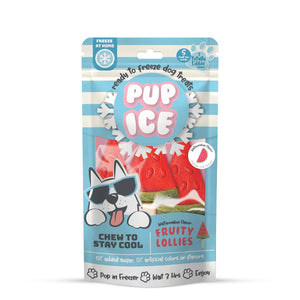As the temperatures rise, nothing beats the sweet, refreshing taste of watermelon. It’s a summertime staple for humans—but what about our four-legged companions? Can dogs eat watermelon? Is it just a tasty treat, or could it pose risks to their health?
With more pet parents embracing fresh, natural foods, fruits like watermelon often land in the spotlight. And while some fruits are safe and even beneficial, others can be harmful to our furry friends. In this blog, we’ll explore watermelon for dogs—what’s safe, what’s not, and how to serve it right. Whether you're slicing up a juicy melon or searching for cool dog-friendly snacks, we’ve got you covered with everything you need to know about dogs and watermelon.
Watermelon for Dogs: Safety Overview
Is watermelon toxic to dogs?
Good news—watermelon is not toxic to dogs. When served properly, it can be a safe and refreshing snack. However, like all treats, it’s important to understand which parts are safe and how much your pup can enjoy without risking their health. Be very specific in terms of de seeding the watermelon first.
Nutrients in Watermelon: A Dog’s Perspective
Watermelon is rich in vitamins A, B6, and C, which support vision, immune function, and energy metabolism. It also contains potassium and magnesium, which help regulate muscle and nerve function.
Caloric breakdown and suitability for dog diets
Watermelon is about 92% water, making it low in calories—perfect for dogs watching their weight. One cup of watermelon has roughly 45–50 calories, depending on the size and ripeness. This makes it an ideal occasional treat for most dogs, even those on calorie-restricted diets.
Read More - Dog Overweight Problems
What Parts of the Watermelon Are Dangerous?
Not all parts of the watermelon are dog-friendly:
-
Seeds: Swallowing a few seeds may not cause harm, but too many can lead to intestinal blockages, especially in small breeds.
-
Rind: Hard to chew and digest, the rind can cause gastrointestinal upset or blockage.
-
Sugar content: While natural, the sugar in watermelon can impact blood sugar levels, making it unsuitable in large amounts for diabetic dogs.
Portion Control and Frequency
Moderation is key. Here’s a quick guide:
-
Small dogs (<10 kg): 1–2 small cubes (1-inch)
-
Medium dogs (10–25 kg): 3–4 cubes
-
Large dogs (25+ kg): 5–6 cubes
Serve watermelon as an occasional treat, not a daily snack. Too much, even of a good thing, can lead to tummy troubles.
Benefits of Feeding Watermelon to Dogs
Hydration and electrolyte support
With its high water content, watermelon helps keep your dog hydrated, especially during hot weather. It also contains electrolytes like potassium, which help with nerve and muscle function.
Promoting digestion with fiber
The natural fiber in watermelon supports healthy digestion and regular bowel movements, especially when fed in small, controlled portions.
Skin and coat health
Thanks to vitamins A and C, watermelon can help promote healthy skin and a shinier coat, acting as a natural skin-supporting boost.
Risks, Allergies, and Side Effects
GI upset symptoms to watch for
Feeding too much watermelon—or parts like the rind—can cause:
-
Diarrhea
-
Bloating
-
Vomiting
-
Flatulence
What to do if your dog eats too much
If your dog has eaten too much watermelon or chewed on the rind or seeds, watch for signs of discomfort. Mild cases may resolve on their own, but if symptoms persist, contact your vet.
Signs of fruit allergies in dogs
While rare, some dogs may be allergic to watermelon. Watch for:
-
Itching
-
Hives
-
Swelling
-
Excessive licking or scratching
If you notice these, stop feeding and consult your vet immediately.
Also Read - What is a Fungal Infection in Dogs?
How to Introduce Watermelon to Your Dog’s Diet
Step-by-step guide
-
Start small: Offer a tiny piece (seedless and rind-free).
-
Observe: Monitor for any allergic reactions or digestive issues.
-
Serve chilled: A cold cube of watermelon makes a fun summer treat!
Monitor and adjust approach
If your dog tolerates it well, you can offer a bit more. Stick to occasional servings and avoid mixing it with other sugary fruits.
Dog-Safe Watermelon Recipes
-
Frozen Watermelon Cubes: Puree watermelon and freeze in silicone molds.
-
Watermelon Pupsicles: Blend with a little plain yogurt and freeze.
-
Fruit Medley Treats: Mix watermelon with dog-safe fruits like blueberries or apples (no seeds!).
Conclusion
So, is watermelon good for dogs? Absolutely—when served safely and in moderation. This hydrating, vitamin-packed fruit is a paw-some summer treat. Just remember: no seeds, no rind, and small portions only. Your pup will thank you for this cool snack!
FAQs About Dogs and Watermelon
1. Are watermelon seeds bad for dogs?
Yes. Seeds can cause intestinal blockages, especially in small dogs. Always serve seedless watermelon.
2. What parts of the watermelon are safe for dogs?
Only the flesh is safe. Avoid feeding the rind and seeds.
3. Can diabetic dogs eat watermelon?
It's best to consult your vet first. While watermelon is low in calories, its natural sugars can affect blood sugar levels.
4. Is watermelon good for senior dogs?
Yes, in moderation. The hydration and vitamins can benefit older dogs, but monitor for any GI issues.
5. Can dogs eat other melons?
Yes! Dogs can eat cantaloupe and honeydew in moderation. As with watermelon, remove seeds and rind before serving.






